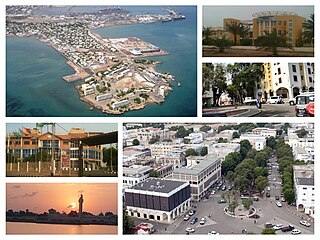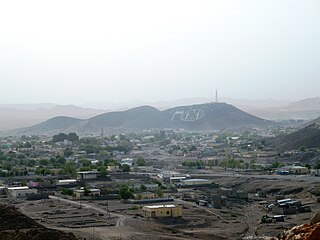Related Research Articles
Djibouti is a country in the Horn of Africa bordered by Somalia to the east, Eritrea to west and the Red Sea to the north, Ethiopia to the west and south, and the Gulf of Aden to the east.

Politics of Djibouti takes place in a framework of a presidential representative democratic republic, whereby the executive power is exercised by the President and the Government. Legislative power is vested in both the Government and the National Assembly. The party system and legislature are dominated by the socialist People's Rally for Progress. In April 2010, a new constitutional amendment was approved. The President serves as both the head of state and head of government, and is directly elected for single six-year term. Government is headed by the President, who appoints the Prime Minister and the Council of Ministers on the proposal of the latter. There is also a 65-member chamber of deputies, where representatives are popularly elected for terms of five years. Administratively, the country is divided into five regions and one city, with eleven additional district subdivisions. Djibouti is also part of various international organisations, including the United Nations and Arab League.

Obock is a small port town in Djibouti. It is located on the northern shore of the Gulf of Tadjoura, where it opens out into the Gulf of Aden. The town is home to an airstrip and has ferries to Djibouti City. The French form Obock derives from Arabic "Oboh", which is a deformation of Oboki, a name given to a local wadi.

Ismaïl Omar Guellé is a Djiboutian politician who has served as the President of Djibouti since 1999, making him one of the longest-serving rulers in Africa. He is often referred to by his initials, IOG.

Hassan Gouled Aptidon was the first President of Djibouti from 1977 to 1999.

Djibouti is the capital of Djibouti. It is located in the coastal Djibouti Region on the Gulf of Tadjoura.

The Djiboutian Music refers to the musical styles, techniques and sounds of Djibouti. The first major form of modern Djiboutian music began in the mid-1940s, when Djibouti was a part of the French Somaliland. Djiboutian music is characterized by poetry, so that listening to a Djiboutian song is first paying attention to its meaning. The artist rocks the listeners in the cheerfulness of the refrains and the turn of the sentences. Often sung by a couple, a song is played in the form of a sleight of hand between a man and a woman, one recounting his feelings and his love, even his passion for the other, until the other accepts or rejects this offer.
The Djibouti national football team, nicknamed the "Riverains de la Mer Rouge", is the national football team of Djibouti. It is controlled by the Djiboutian Football Federation and is a member of the Confederation of African Football (CAF) and the Union of Arab Football Associations (UAFA). The Djibouti national football team's first win in a full FIFA-sanctioned international match was a 1–0 win vs. Somalia in the first round of the 2010 FIFA World Cup qualification.

Foreign relations of the Republic of Somaliland are the responsibility of the Ministry of Foreign Affairs of the Republic of Somaliland. The region's self-declaration of independence remains unrecognised by the international community.

The Dir is one of the largest and most prominent Somali clans in the Horn of Africa. They are also considered to be the oldest Somali stock to have inhabited the region. Its members inhabit Djibouti, Somalia, Ethiopia, and northeastern Kenya.

Ali Sabieh is the second largest city in Djibouti. It is situated about 98 kilometres Southwest of Djibouti City and 10 km (6 mi) north of the border with Ethiopia. It sprawls on a wide basin surrounded by granitic mountains on all sides. Ali Sabieh's mild climate makes it a popular tourist destination for Djiboutians. The famous landmark of Ali Sabieh mountain is located near the city.

Djibouti took part in the 1984 Summer Olympics, which were held in Los Angeles, United States from July 28 to August 12. The 1984 Summer Olympics were Djibouti's first Olympic appearance. The delegation included three marathon athletes, Djama Robleh, Ahmed Salah, and Omar Abdillahi Charmarke, none of whom won a medal.

The Djiboutians are the native inhabitants of Djibouti, as well as the global diaspora of Djibouti. The country is mainly composed of two ethnic groups, the Somali and the Afar. It has many languages - though Somali and Afar are the most widely spoken ones, Arabic and French serve as the official languages. There is a small Djiboutian diaspora in North America, Europe, and Australia.

Djibouti, officially the Republic of Djibouti, is a country in the Horn of Africa, bordered by Somalia to the south, Ethiopia to the southwest, Eritrea in the north, and the Red Sea and the Gulf of Aden to the east. The country has an area of 23,200 km2 (8,958 sq mi).

The Front for the Liberation of the Somali Coast was a nationalist organization, and later a guerrilla group that fought for the independence of Djibouti from France. The Front de Libération de la Côte des Somalis (FLCS) was recognized as a national liberation movement by the Organization of African Unity (OAU), which participated in its financing. FLCS was able to obtain support from Arab countries such as Algeria.

Mahamoud Harbi Farah was a Djiboutian politician of Somali ethnicity. A pan-Somalist, he was the Vice President of the Government Council of French Somaliland from 1957 to December 1958, during Djibouti's pre-independence period.

The 2015 Kagame Interclub Cup was the 40th edition of the Kagame Interclub Cup, which is organised by CECAFA. It took place in Tanzania from 18 July to 2 August.

Presidential elections were held in Djibouti on 8 April 2016. Incumbent President Ismaïl Omar Guelleh was re-elected for a fourth term, receiving 87% of the vote in the first round.

Djama Ali Moussa Zayli'i was a Somali politician. He was a politician of the former French Somaliland, currently known as Djibouti.

Fadumo Ahmed Dhimbiil was a Djiboutian poet, singer, and songwriter.
References
- ↑ "A Jihad against Somali Music in the Land of Freedom Somalilandpress". somalilandpress. 2015-02-16. Archived from the original on 2017-06-07. Retrieved 21 December 2016.
- ↑ "Djibouti – Nima Djama". News. africaintelligence. 2015. Retrieved 21 December 2016.